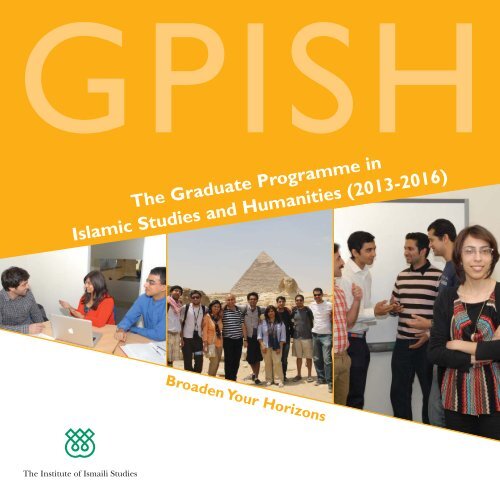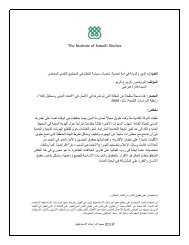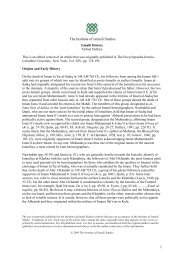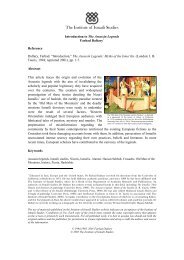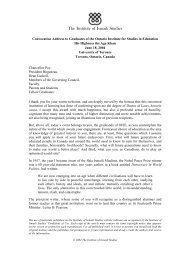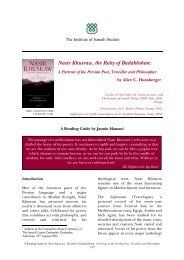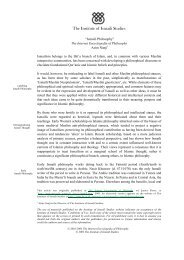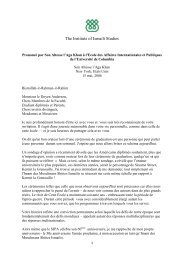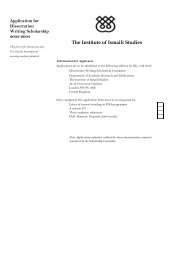GPISH prospectus 2012-16_Layout 1.qxd - The Institute of Ismaili ...
GPISH prospectus 2012-16_Layout 1.qxd - The Institute of Ismaili ...
GPISH prospectus 2012-16_Layout 1.qxd - The Institute of Ismaili ...
You also want an ePaper? Increase the reach of your titles
YUMPU automatically turns print PDFs into web optimized ePapers that Google loves.
<strong>GPISH</strong><br />
<strong>The</strong> Graduate Programme in<br />
Islamic Studies and Humanities (2013-20<strong>16</strong>)<br />
Broaden Your Horizons
Welcome<br />
Message from the Director <strong>of</strong> the IIS<br />
<strong>The</strong> <strong>Institute</strong> <strong>of</strong> <strong>Ismaili</strong> Studies (IIS) was established in 1977 with<br />
the object <strong>of</strong> promoting scholarship and learning on Muslim<br />
societies and cultures, historical as well as contemporary, and a<br />
better understanding <strong>of</strong> its relationship with other societies and<br />
faiths. <strong>The</strong> above objectives are realised through programmes and<br />
activities organised and implemented by the various Departments<br />
<strong>of</strong> the <strong>Institute</strong>. <strong>The</strong> Department <strong>of</strong> Graduate Studies currently<br />
<strong>of</strong>fers two post graduate level programmes, the Graduate<br />
Programme in Islamic Studies and Humanities (<strong>GPISH</strong>) and the<br />
Secondary Teacher Education Programme (STEP).<br />
In pursuit <strong>of</strong> these objectives, the <strong>Institute</strong> periodically collaborates, on a programme<br />
specific basis, with other institutions <strong>of</strong> learning. In this spirit, the IIS works with the<br />
<strong>Institute</strong> <strong>of</strong> Education at the University <strong>of</strong> London to deliver the Secondary Teacher<br />
Education Programme (STEP). <strong>The</strong> collaboration is designed to address the training <strong>of</strong><br />
teachers within a framework that links their Muslim heritage to the intellectual methods<br />
and best practices available in the academic environment.<br />
STEP is a pioneering, collaborative programme for producing teachers who will teach the<br />
interdisciplinary Secondary Curriculum (developed by the IIS) to young people globally. This<br />
programme culminates in an MA and MTeach, both awarded by the IOE.<br />
<strong>GPISH</strong> is an innovative, interdisciplinary three year programme in Islamic Studies and<br />
Humanities, the first two years <strong>of</strong> which are spent at the IIS. All <strong>GPISH</strong> students attend a<br />
British university for their Masters in their third year. <strong>The</strong> majority <strong>of</strong> students attend either<br />
a Russell Group or Group <strong>of</strong> 1994 institution including Oxford, Cambridge, <strong>The</strong> London<br />
School <strong>of</strong> Economics and Political Science (LSE) and the School <strong>of</strong> Oriental and African<br />
Studies (SOAS). Both programmes are designed to meet the human resource needs for<br />
educators, intellectuals and leaders for the community, ummah and society at large.<br />
Dr Farhad Daftary<br />
Director, <strong>The</strong> <strong>Institute</strong> <strong>of</strong> <strong>Ismaili</strong> Studies
Introduction<br />
<strong>The</strong> Graduate Programme in Islamic Studies and Humanities encourages a perspective which<br />
is not confined to the theological and religious heritage <strong>of</strong> Islam, but seeks to explore the<br />
relationship <strong>of</strong> religious ideas to broader dimensions <strong>of</strong> society and culture. It thus encourages<br />
an inter-disciplinary approach to the materials <strong>of</strong> Islamic history and thought. Particular<br />
attention is also given to issues <strong>of</strong> modernity that arise as Muslims seek to relate their heritage<br />
to contemporary circumstances.<br />
Within the Islamic tradition, <strong>GPISH</strong> seeks to promote research on those areas which have had<br />
relatively lesser attention devoted to them in secondary scholarship to date. <strong>The</strong>se include the<br />
intellectual and literary expressions <strong>of</strong> Shi’ism in general, and <strong>Ismaili</strong>sm in particular.<br />
In the context <strong>of</strong> Islamic societies, <strong>GPISH</strong> is informed by the full range and diversity <strong>of</strong> cultures<br />
in which Islam is practiced today, from the Middle East, Southern and Central Asia and Africa to<br />
the industrialized societies <strong>of</strong> the West, thus taking into consideration the variety <strong>of</strong> contexts<br />
which shape the ideals, beliefs and practices <strong>of</strong> the faith.<br />
3<br />
Introduction
Statement <strong>of</strong> Philosophy<br />
<strong>The</strong> principles outlined here inform all the intellectual programmes <strong>of</strong> the <strong>Institute</strong>, including<br />
the two graduate programmes <strong>of</strong> study, as well as research, seminars or conferences, and public<br />
lectures. <strong>The</strong> Graduate Programme in Islamic Studies and Humanities, in particular, reflects a<br />
basic re-assessment <strong>of</strong> conventional, academic programmes in this field. Essentially, it seeks to<br />
integrate areas and methodologies that have become separated in many existing programmes.<br />
<strong>The</strong> philosophy <strong>of</strong> the graduate programme also reflects the premises guiding the <strong>Institute</strong>’s<br />
intellectual activities as a whole. Among the levels on which integration as well as new<br />
perspectives are intended, the following are noteworthy.<br />
Intellectual Disciplines<br />
<strong>The</strong> programme seeks to avoid a division <strong>of</strong> pertinent disciplines – e.g. history, anthropology,<br />
political science, philosophical analysis, linguistic and literary criticism – in the study <strong>of</strong> Muslim<br />
societies. It aims to do more than merely encourage cross-references between them. Its<br />
objective is rather to promote an approach in which the disciplines are intertwined at their<br />
roots, to produce an integrated analysis <strong>of</strong> the subject, conceived as broadly as possible.<br />
4<br />
Statement <strong>of</strong><br />
Philosophy<br />
Integrated subject matter<br />
Behind this approach to methods <strong>of</strong> study there lies a specific approach to the subject-matter<br />
too. <strong>The</strong> premise here is that “Islam” can more fruitfully be treated as a civilization rather than<br />
a religion only. This premise has implications for the treatment <strong>of</strong> the subject-matter. Instead <strong>of</strong><br />
conventional divisions such as theology, law and mysticism, representing distinct religious<br />
interpretations <strong>of</strong> Islam, the programme treats these and other issues in the common<br />
framework <strong>of</strong> a cultural history. This means, first, that religious developments will be seen as<br />
part <strong>of</strong> the development <strong>of</strong> thought and culture in Muslim societies. Secondly, those aspects <strong>of</strong><br />
culture, like art, poetry and architecture, which are not always treated at par with doctrine, law<br />
or religious practice, will be so regarded in this programme.Thirdly, as culture cannot be studied<br />
in isolation from society, the programme will treat this inter-relationship (<strong>of</strong> ideas and meanings<br />
to social and political forces) as one <strong>of</strong> the keys to an integrated understanding <strong>of</strong> the subject.<br />
Historical emergence <strong>of</strong> forms and definitions<br />
If the inter-relationship <strong>of</strong> cultural factors to socio-political ones (as indicated above) is <strong>of</strong><br />
importance, it means that the diverse definitions and schools <strong>of</strong> thought which emerged in Islam<br />
must be understood historically. <strong>The</strong> division <strong>of</strong> Islam into its existing sects and schools was not
always a neat or hard and fast phenomenon at all periods <strong>of</strong> history. <strong>The</strong> number and<br />
boundaries <strong>of</strong> the groups tended to fluctuate with time and place. <strong>The</strong> programme will show<br />
the emergent character <strong>of</strong> these divisions, rather than assuming them as a given fact. Similarly,<br />
assumptions (even where these are implicit rather than explicit) like “orthodoxy” and<br />
“heterodoxy” have a strong influence on the way in which Islam is understood. Again, the<br />
historically-based approach in this programme will seek to understand how and where these<br />
or similar concepts were arrived at, rather than taking them as given.<br />
Poetic and imaginative discourse<br />
An historical approach to Islam must be balanced by a due appreciation <strong>of</strong> the meaning<br />
religious ideas have for their followers, and the centrality <strong>of</strong> spiritual and ethical aspirations<br />
in their lives. <strong>The</strong> programme will give due attention, therefore, to the role <strong>of</strong> poetic and<br />
imaginative discourse in the shaping <strong>of</strong> spiritual life in Muslim cultures.<br />
Cultural diversity<br />
While the approach to Islam as a civilization is intended to integrate as well as enlarge both the<br />
subject-matter and the angles <strong>of</strong> study, this does not preclude an appreciation <strong>of</strong> the enormous<br />
diversity <strong>of</strong> Muslim societies. One <strong>of</strong> the objectives <strong>of</strong> the programme is to re-examine all<br />
explicit and implicit descriptions <strong>of</strong> Islam as a monolithic phenomenon. It will examine the<br />
dialectic <strong>of</strong> cultures whereby a variety <strong>of</strong> older, existing traditions were assimilated, transformed<br />
and synthesized, in most areas, into regional expressions <strong>of</strong> Islam. <strong>The</strong> diversity <strong>of</strong> these<br />
expressions must be noted without normative preconceptions about their validity. <strong>The</strong><br />
programme will study the diverse features <strong>of</strong> Islamic culture in such significant areas as the<br />
Middle East, South-east Asia, the Indian subcontinent and Africa south <strong>of</strong> the Sahara, without<br />
assuming such distinctions as that between “peripheral” and “central” Islamic lands. Similarly,<br />
the programme will examine the important role <strong>of</strong> not only “classical” languages (Arabic,<br />
Persian) but also national, regional or local vernaculars in the evolution <strong>of</strong> Islamic sensibilities.<br />
Two other implications <strong>of</strong> this non-normative approach may be noted. One is to re-examine<br />
the one-sided emphasis, in many scholarly accounts, on “learned” (or textual) Islam to the<br />
relative neglect <strong>of</strong> “popular” and oral traditions, and to note the validity <strong>of</strong> these varying<br />
ffsfsff<br />
Statement <strong>of</strong><br />
Philosophy<br />
5
expressions in their respective contexts. <strong>The</strong> other, related objective is to avoid exclusive<br />
concentration on doctrinal and intellectual formulations, and to balance these by full<br />
attention to the practical manifestation <strong>of</strong> Islamic ideals in living societies.<br />
Because <strong>of</strong> the last-mentioned issue, anthropology will have no lesser place as a tool <strong>of</strong><br />
analysis in the programme than the “classical” disciplines <strong>of</strong> philology, history, etc. However,<br />
the insights <strong>of</strong> anthropology will be marshalled widely in the study <strong>of</strong> the civilization as a<br />
whole. This will enable anthropological analysis to range well beyond its traditional<br />
concentration on local rather than national and international societies and cultures.<br />
6<br />
Resources<br />
Bridging history and contemporary societies<br />
Despite recent attempts to link the two, there is a persisting tendency for research into the<br />
past to proceed along separate lines from the study <strong>of</strong> contemporary Muslim societies. This<br />
is in part reinforced by academic departmentalization, whereby those trained in economics,<br />
sociology and politics tend to focus on contemporary developments, to the relative neglect<br />
<strong>of</strong> religious and historical topics, and vice versa. <strong>The</strong> intellectual framework <strong>of</strong> this<br />
programme is designed to bridge this gap. It assumes that spiritual or existential issues are<br />
as relevant to contemporary Muslim societies as they were in history. <strong>The</strong> study <strong>of</strong> the vast<br />
changes introduced in these societies in the modern period will pay attention to the<br />
meaning and images <strong>of</strong> the past which are current in these societies. It will focus as much<br />
on the spiritual implications <strong>of</strong> social change as on the reverse relationship, both in history<br />
and contemporary life.<br />
Re-examining the boundaries <strong>of</strong> civilizations<br />
<strong>The</strong> polarity <strong>of</strong> “Islam” and the “West”, assumed in much <strong>of</strong> contemporary discourse about<br />
the subject, needs to be subjected to critical analysis. <strong>The</strong> graduate programme (as well as<br />
parallel research, public lectures and publications) will examine the origins, logic and the<br />
consequences, political and cultural, <strong>of</strong> this categorization. <strong>The</strong> overlap <strong>of</strong> some <strong>of</strong> the more<br />
fundamental issues <strong>of</strong> society and culture today (across Western and non-Western lands, or<br />
across the developed and developing worlds) need to be noted without the distortions<br />
inherent in too facile an opposition between the “West” and “non-West”.<br />
For the same reasons, some <strong>of</strong> the key issues addressed in the programme (as, for example,<br />
the module on Reason and Imagination) will be treated in a global or comprehensive rather<br />
than regional context.
<strong>GPISH</strong> as seen by its Students<br />
“<strong>GPISH</strong> is<br />
all about<br />
learning to<br />
find out<br />
what you<br />
are<br />
passionate about and<br />
pursuing it. It exposes you to<br />
a variety <strong>of</strong> disciplines that<br />
open up various possibilities.<br />
If you believe in growing<br />
through your education,<br />
<strong>GPISH</strong> is definitely going to<br />
facilitate that.”<br />
Naureen Ali<br />
Class <strong>of</strong> 2013<br />
“<strong>GPISH</strong><br />
provides<br />
students<br />
with a<br />
unique<br />
opportunity<br />
to be both immersed in an<br />
<strong>Ismaili</strong> setting, while looking<br />
at it through a scholarly lens.<br />
<strong>GPISH</strong> will challenge the way<br />
one looks at the world and<br />
encourage students to think<br />
in new ways.”<br />
Rozina Kanchwala<br />
Class <strong>of</strong> 2011<br />
7<br />
<strong>GPISH</strong> as Seen<br />
by its Students
8<br />
"In <strong>GPISH</strong>,<br />
the value <strong>of</strong><br />
community is<br />
paramount.<br />
<strong>The</strong> emphasis<br />
to grow with<br />
your classmates is within the<br />
very structure <strong>of</strong> the program<br />
from orientation to the<br />
academic excursion to Cairo<br />
and Spain. It is an honor to<br />
study at <strong>The</strong> <strong>Institute</strong> <strong>of</strong><br />
<strong>Ismaili</strong> Studies not only<br />
because <strong>of</strong> its calibre <strong>of</strong><br />
faculty and reputation as an<br />
institution, but because <strong>of</strong> the<br />
people in the classroom<br />
learning beside you."<br />
“<strong>GPISH</strong><br />
is very<br />
challenging,<br />
with its<br />
intensive<br />
language<br />
study and expectations in work<br />
with our other courses. It is<br />
through this process that<br />
students learn skills to adapt<br />
to ever-changing circumstance,<br />
which may be encountered in<br />
our future careers, whatever<br />
they may be.”<br />
Karim Mitha<br />
Class <strong>of</strong> 2011<br />
<strong>GPISH</strong> as Seen<br />
by its Students<br />
Naveed Nanjee<br />
Class <strong>of</strong> 2014
“Unlike<br />
traditional<br />
academic<br />
institutions,<br />
<strong>GPISH</strong><br />
<strong>of</strong>fers<br />
a rare opportunity to<br />
experience an education<br />
that aimed at bypassing<br />
traditional boundaries <strong>of</strong><br />
disciplines to enrich your<br />
thought with broadness <strong>of</strong><br />
knowledge and<br />
understanding. Now I am<br />
very confident about<br />
benefitting from my training<br />
in Humanities and Islamic<br />
Studies in my future career<br />
in architecture and<br />
development.”<br />
Wisam Elhamoui<br />
(Class <strong>of</strong> 2011)<br />
Wisam Elhamoui<br />
(Class <strong>of</strong> 2011)<br />
“We are<br />
all looking<br />
for paths<br />
which can<br />
lead us to<br />
success<br />
and contentment. For me,<br />
being accepted in <strong>GPISH</strong><br />
would be one <strong>of</strong> them, a<br />
route which would inspire<br />
me as I traverse it, and<br />
would add zest to my life,<br />
encouraging me to nurture<br />
my aspirations rationally.”<br />
Afshan Mohammad<br />
Class <strong>of</strong> 2014<br />
<strong>GPISH</strong> as Seen<br />
by its Students<br />
9
Programme<br />
Language Study: Arabic or Persian<br />
Arabic is compulsory in the first two years <strong>of</strong> the programme for all students not pr<strong>of</strong>icient<br />
in this language. <strong>The</strong> Department runs three levels <strong>of</strong> Arabic and students are placed<br />
according to their prior knowledge and experience. <strong>The</strong> overall aim is to equip students<br />
with the skills needed to read primary texts in Arabic in different disciplines and from<br />
different periods. Prior to the start <strong>of</strong> the first year, students undertake a four week<br />
Intensive Arabic Pre-sessional course at the IIS. At the end <strong>of</strong> the first year, students<br />
participate in a summer Arabic immersion programme in an Arabic speaking country.<br />
Students who are already fluent in Arabic take Persian, in order to read and understand core<br />
Persian texts. Persian language study includes participation in a summer Persian immersion<br />
programme in Iran. Students may also have the opportunity to study other languages used in<br />
Muslim societies.<br />
10<br />
Programme
Proposed Modules<br />
(<strong>The</strong> <strong>GPISH</strong> curriculum is undergoing a review<br />
process and these modules are subject to change)<br />
Muslim Societies and Civilisation (History) (3 terms in the first year)<br />
<strong>The</strong> Qur’an (2 terms)<br />
<strong>The</strong> Prophet Muhammad through History (1 term)<br />
Law, Ethics and Society (2 terms)<br />
Key Moments in Shi’a History, Thought and Society (1 term)<br />
Key Moments in <strong>Ismaili</strong> History (1 term)<br />
Research Methods (1 term)<br />
Topics in the Philosophy <strong>of</strong> Religion (1 term)<br />
11<br />
Intellectual Traditions (1 term)<br />
<strong>The</strong> Arts (2 terms)<br />
Ritual, Worship and Practice (1 term)<br />
“<strong>GPISH</strong> <strong>Ismaili</strong>s in Modern is all about Times (1 learning term) to find out what you are passionate about<br />
and pursuing it. It exposes you to a variety <strong>of</strong> disciplines that open up<br />
Religion, Literature and identity in South Asian Muslim contexts (1 term)<br />
various possibilities. If you believe in growing through your education,<br />
<strong>GPISH</strong> is definitely going to facilitate that.”<br />
Naureen Ali<br />
Class <strong>of</strong> 2013<br />
Programme
Field projects carried out by<br />
students include:<br />
Exploring media use among students in<br />
Dar-es-Salam'<br />
12<br />
'A study <strong>of</strong> the theatrical performance <strong>of</strong><br />
the Shahname in Post-Soviet Tajikistan'<br />
'People's experiences <strong>of</strong> micr<strong>of</strong>inance in<br />
Booni, Chitral: Is there a way to think<br />
beyond the current Impact Assessment<br />
Indicators <strong>of</strong> the FMFB?'<br />
'Exploring identity through ritual: A<br />
comparison <strong>of</strong> Khojah <strong>Ismaili</strong> and Lohanas<br />
Hindu wedding rituals in Maliya, Gujarat'<br />
'Senses and perceptions on place in<br />
Khorog: A phenomonology <strong>of</strong> the Pamiri<br />
home'<br />
'<strong>The</strong> role <strong>of</strong> the curriculum as a mediating<br />
agency at Horizons Al-Ummah Camp in<br />
Canada'<br />
Programme<br />
Field Projects<br />
<strong>The</strong> field project is an integral part <strong>of</strong> the Graduate Programme and is designed to<br />
encourage each student to formulate and conduct a research project which can serve as a<br />
basis for continued post-graduate study or career development. Students will conduct<br />
research during the summer <strong>of</strong> their second academic year. <strong>The</strong> field project is an<br />
opportunity for students to produce an original piece <strong>of</strong> research.<br />
A research supervisor is allocated to each student to guide them in planning, preparing,<br />
conducting and writing up their field reports. A module on Research Design and Methods is<br />
also taught in the second year to provide students with the necessary tools to plan and conduct<br />
an empirical study.Towards the completion <strong>of</strong> this module, students will be expected to submit<br />
a project proposal, including a budget proposal for their project. Each student’s project has to<br />
be approved by a committee comprising <strong>of</strong> the Course Director, Module Convenor, <strong>GPISH</strong><br />
Coordinator and Research Supervisor. Approved projects are awarded modest funding to<br />
contribute to the cost <strong>of</strong> travel to and from the place <strong>of</strong> research and project-related expenses.<br />
Students will be evaluated on the presentation <strong>of</strong> their research project, in the form <strong>of</strong> a<br />
report <strong>of</strong> 10,000 words. <strong>The</strong> report will be evaluated by an internal examiner and an<br />
external examiner. Students must pass the field project in order to be conferred with <strong>The</strong><br />
IIS’ post-graduate award in Islamic Studies and the Humanities. Students should also be<br />
aware that funding for their Master's work in the third year is dependent on the timely<br />
receipt <strong>of</strong> their research reports.<br />
Language Immersion trips<br />
<strong>The</strong> study <strong>of</strong> Arabic (Persian for those fluent in Arabic) is central to the programme as it enables<br />
students to read and understand the Qur’an and other primary texts. In addition to two years<br />
<strong>of</strong> language training at the IIS, students also attend a four week intensive language immersion<br />
programme in an Arabic speaking country (Iran or Tajikistan for those studying Persian) at the<br />
end <strong>of</strong> their first year. This is an opportunity for students to immerse themselves in the language<br />
and culture <strong>of</strong> an Arab/Persian-speaking country. In the past students have also attended<br />
language immersion programmes in Morocco, Egypt, Tunisia and Yemen.<br />
Students have carried out field projects in: Australia ► Canada ► China ►<br />
Egypt ► Germany ► India ► Iran ► Japan ► Kenya ► Kyrgyzstan ► Lebanon ►<br />
Malaysia ► Mali ► Morocco ► Pakistan ► Switzerland ► Syria ► Tajikistan ►<br />
Tanzania ► Turkey ► Uganda ► UK ► USA ► Yemen ►
Over the past three few years, the following<br />
presentations have been made by<br />
<strong>GPISH</strong> students at conferences<br />
around the world:<br />
“Portraiture as Diplomatic Communication<br />
in the time <strong>of</strong> Mehmed II” Sabrina A.<br />
Bandali (Class <strong>of</strong> 2008)<br />
International Congress<br />
<strong>of</strong> Turkish Art<br />
– September 2007<br />
“Belonging to the Nation’ A Perspective<br />
From the Pamir, Tajikistan”<br />
Laila Kadiwal (Class <strong>of</strong> 2009)<br />
AMSS UK<br />
conference - March 2009<br />
“Home Away From Home: <strong>The</strong> Return<br />
<strong>of</strong> <strong>Ismaili</strong> Muslims to Uganda”<br />
(A documentary film)<br />
Aleem Karmali (Class <strong>of</strong> 2009)<br />
Duke-UNC Graduate Islamic Studies<br />
Conference - April 2009<br />
13<br />
Field Trips<br />
Students will undertake field trips in order to have a direct encounter with two <strong>of</strong> the<br />
societies being studied. First-year students visit Cairo, Egypt and second-year students visit<br />
Andalusia, Spain. Prior readings and orientation are complemented by a lecturer who<br />
accompanies students on these trips and to ensure that it is an academically and culturally<br />
enriching experience.<br />
Programme
Third Year Master’s degree<br />
Students spend the third-year studying for a Master’s degree at a UK degree-granting<br />
university in a subject area that resonates with the aims <strong>of</strong> the Graduate Programme.<br />
Although no longer resident at the IIS, all third year students are considered to be students<br />
<strong>of</strong> the Department <strong>of</strong> Graduate Studies. Students must keep the Department aware <strong>of</strong> their<br />
academic progress and career plans. <strong>The</strong> Department may also invite third year students to<br />
return to the IIS to present their work.<br />
University <strong>of</strong> Oxford<br />
SOAS<br />
LSE<br />
University <strong>of</strong> Cambridge<br />
<strong>Institute</strong> <strong>of</strong> Education<br />
Sussex University<br />
University <strong>of</strong> Edinburgh<br />
UCL<br />
Goldsmiths<br />
Kings College London<br />
Other<br />
Universities students have attended<br />
14<br />
Programme<br />
Disciplines students have pursued<br />
for their third year<br />
Islamic Studies<br />
Education<br />
Anthropology<br />
Development<br />
Social Sciences<br />
Political Science<br />
Law<br />
Media<br />
Literature<br />
Architecture<br />
Other Humanities<br />
Other
Faculty<br />
<strong>The</strong> faculty comprises lecturers who have made significant contributions to scholarship and are<br />
engaged in innovative research projects in their respective fields. Each student is assigned an<br />
Academic Advisor, to provide them additional academic support. Lecturers include IIS and<br />
visiting scholars from leading international academic institutions:<br />
Pr<strong>of</strong>. Ali Asani<br />
Dr. Karen Bauer<br />
Dr. Stephen Burge<br />
Pr<strong>of</strong>. Clive Bush<br />
Dr. Maria De Chillis<br />
Dr. Farhad Daftary<br />
Dr. Aziz Esmail<br />
Pr<strong>of</strong>. Benjamin Fortna<br />
Dr. Laila Halani<br />
Dr. Shainool Jiwa<br />
Dr. Reza Shah Kazemi<br />
Pr<strong>of</strong>. Hermann Landolt<br />
Pr<strong>of</strong>. Wilfred Madelung<br />
Farhana Mayer<br />
Dr. Toby Mayer<br />
Anna McSweeney<br />
Pr<strong>of</strong>essor Eric Ormsby<br />
Dr. Maryam Rezaee<br />
Dr. Farouk Topan<br />
Dr. Fayyaz Vellani<br />
15<br />
Faculty
Resources<br />
Department <strong>of</strong> Graduate Studies<br />
<strong>The</strong> Head <strong>of</strong> Graduate Studies oversees all the activities <strong>of</strong> the Department.<br />
<strong>The</strong> <strong>GPISH</strong> Course Director is directly responsible for all academic aspects <strong>of</strong> the<br />
programme and provides strategic input in all other aspects <strong>of</strong> the programme. <strong>The</strong> <strong>GPISH</strong><br />
Coordinator has oversight responsibility for the management and implementation <strong>of</strong> the<br />
academic programme and all programmatic activities, and is the first point <strong>of</strong> contact for the<br />
students on academic matters. Student Services are responsible for overseeing all student<br />
services, <strong>of</strong>fice systems, administrative matters related to student welfare such as<br />
accommodation, immigration and academic records within the Department, and liaising with<br />
students and lecturers for assignments and grades. <strong>The</strong> English for Academic Purposes<br />
Coordinator works with all students to develop and enhance their critical reading and writing<br />
skills required for post-graduate studies. She coordinates the Khorog English Preparatory<br />
Programme in Tajikistan which <strong>of</strong>fers language support and training for academic study in<br />
English. She also coordinates a similar programme in Damascus run jointly with the British<br />
Council.<br />
<strong>16</strong><br />
<strong>The</strong> Administrator for the Department <strong>of</strong> Graduate Studies is responsible for all the<br />
financial dealings within the Department, and is the first point <strong>of</strong> contact for financial issues<br />
such as receiving stipends, taking out loans or reimbursement <strong>of</strong> expenses. <strong>The</strong><br />
Administrator is also responsible for timetabling, room bookings and maintaining and<br />
updating our Virtual Learning Environment (MOODLE).<br />
In addition, each student is assigned an Academic Advisor, who provides individual academic<br />
support.<br />
Resources<br />
Representatives from the student body sit on the <strong>GPISH</strong> Programme Board (PB) to ensure<br />
effective communication between the students and the Department. Students also have<br />
access to a confidential welfare and counselling service. A student affairs fund supports<br />
cultural and social activities.
Library Resources<br />
Faculty and students have access to specialized library collections in Islamic Studies at the<br />
School <strong>of</strong> Oriental and African Studies, Senate House as well as at the <strong>Institute</strong>’s Library.<br />
In its relatively short history, the IIS Library has grown into a leading centre and repository<br />
for rare and significant resources illustrative <strong>of</strong> the pluralism <strong>of</strong> <strong>Ismaili</strong> thought and tradition.<br />
<strong>The</strong> IIS Library’s collection comprises nearly 30,000 items. Its general collection <strong>of</strong> printed<br />
materials consists <strong>of</strong> reference works, books, periodicals, journal articles and theses on<br />
various aspects <strong>of</strong> Islamic history, theology, philosophy, law and literature, with a focus on<br />
Shi‘i works and esoteric traditions. Besides this core collection in Islamic studies, the Library<br />
has a specialised holding <strong>of</strong> <strong>Ismaili</strong> printed materials comprising nearly 1,000 volumes <strong>of</strong><br />
texts and monographs, over 700 articles and <strong>of</strong>fprint’s, as well as a small collection <strong>of</strong> <strong>Ismaili</strong><br />
journals. <strong>The</strong> manuscript collection <strong>of</strong> the <strong>Institute</strong>’s Library consists <strong>of</strong> nearly 1,500<br />
volumes. Besides a small nucleus <strong>of</strong> manuscripts that contain the text <strong>of</strong> the Holy Qur’an,<br />
the scope <strong>of</strong> the collection encompasses a variety <strong>of</strong> subjects including jurisprudence,<br />
theology, philosophy, logic, grammar, medicine, astronomy and alchemy, as well as poetical<br />
and biographical works.<br />
Computing Facilities<br />
Students enrolled in the <strong>Institute</strong>’s programmes have access to computing and online<br />
facilities, within the <strong>Institute</strong>. In addition, an IT loan scheme enables students to purchase a<br />
laptop computer.<br />
17<br />
Conference Fund<br />
Students are encouraged to attend and participate in conferences. <strong>The</strong> Department<br />
contributes a modest amount towards the costs. Preference is given to those students who<br />
are presenting a paper.<br />
Resources
Career Pathways<br />
<strong>The</strong> completion <strong>of</strong> the three-year course <strong>of</strong> study will prepare graduates <strong>of</strong> the Graduate<br />
Programme in Islamic Studies and Humanities to pursue higher education in Islamic Studies<br />
and related areas <strong>of</strong> the humanities and social sciences; to seek careers in specific fields; or<br />
to seek careers in areas which attempt to address pressing issues faced by contemporary<br />
Muslim societies. <strong>The</strong>se may include careers: in religious education or the management <strong>of</strong><br />
religious education programmes <strong>of</strong> the <strong>Ismaili</strong> Tariqah and Religious Education Boards; in<br />
Aga Khan Network agencies or other non-governmental organizations, focusing on<br />
education, strengthening <strong>of</strong> civil society, cultural preservation, poverty alleviation or<br />
sustainable development; in one <strong>of</strong> the departments at the <strong>Institute</strong> <strong>of</strong> <strong>Ismaili</strong> Studies; in the<br />
media which represent Muslims and Islam to a wider audience; or as Muslim artists or<br />
writers who, through their work, represent individual perspectives towards their received<br />
heritage.<br />
Past graduates <strong>of</strong> the Graduate Programme in Islamic Studies and Humanities are now engaged<br />
in careers and research in fields as diverse as Islamic studies, Islamic Law, education, public<br />
health, ethnomusicology, art history, media studies, and as AKDN representatives.<br />
18<br />
While the Department <strong>of</strong> Graduate Studies does not place students in employment, it does<br />
provide opportunities to meet with recruitment <strong>of</strong>ficers <strong>of</strong> Jamati and AKDN institutions.<br />
Each year, <strong>The</strong> IIS holds a Career Pathways Seminar which provides students with an<br />
opportunity to learn more about the various career options available to them. <strong>The</strong> IIS also<br />
has an Alumni Office which <strong>of</strong>fers internships for <strong>GPISH</strong> graduates. For those interested in<br />
pursuing careers in academia, the IIS <strong>of</strong>fers competitive scholarships for doctoral<br />
programmes.<br />
Career pathways followed<br />
by our alumni<br />
Resources<br />
Academia<br />
Government<br />
Development (including AKDN)<br />
Private Sector<br />
Education<br />
Religious Education
Application and Admissions Procedure<br />
Applications to the Graduate Programme in Islamic Studies and the Humanities are reviewed<br />
by an Admissions Committee. Application forms can be obtained from Student Services at<br />
the <strong>Institute</strong>. <strong>The</strong>y must be completed in full and all supporting documentation attached.<br />
To be eligible for admission, applicants should have completed a first degree <strong>of</strong> good<br />
standing from an accredited university.<br />
In view <strong>of</strong> the fact that the Graduate Programme is multi-disciplinary and issue-based,<br />
exposure to the academic study <strong>of</strong> Islam or the social sciences or the humanities is<br />
desirable, but not mandatory.<br />
An acceptable level <strong>of</strong> English pr<strong>of</strong>iciency is required. Applicants who have not undertaken<br />
university education in English in the UK, USA, Canada, Australia or New Zealand must<br />
submit a TOEFL or IELTS score. <strong>The</strong> minimum scores required for entry to the Graduate<br />
Programme are: 92 (Internet-based TOEFL); 6.5 (IELTS). Applicants who have completed<br />
at least one year <strong>of</strong> university-level studies in one <strong>of</strong> the above countries may be exempt<br />
from submitting TOEFL/IELTS scores. Note that paper based TOEFL scores are not<br />
acceptable.<br />
Shortlisted applicants will be interviewed and will be required to sit for a written<br />
examination. Interviews are meant to ascertain intellectual breadth, analytical skills and an<br />
interest in issues relating to the study <strong>of</strong> Muslim societies. Admission to the Graduate<br />
Programme does not guarantee admission to a degree-granting university for the third<br />
year <strong>of</strong> study. Applicants are fully responsible for gaining admission.<br />
19<br />
All successful applicants to <strong>GPISH</strong> are <strong>of</strong>fered an IIS scholarship that covers tuition fees,<br />
a monthly stipend for living expenses, and single accommodation in student housing.Please<br />
note that due to changes in the UKBA student visa regulations, successful applicants will<br />
not be able to bring dependents to the UK whilst on an IIS student visa. For further<br />
information please contact the Department <strong>of</strong> Graduate Studies Office.<br />
Application and<br />
Admissions<br />
Procedure
Contact Details<br />
For all queries and an application pack to the<br />
Graduate Programme in Islamic Studies<br />
and Humanities, please contact:<br />
Admissions Office<br />
Department <strong>of</strong> Graduate Studies<br />
<strong>The</strong> <strong>Institute</strong> <strong>of</strong> <strong>Ismaili</strong> Studies<br />
210 Euston Road<br />
London NW1 2DA<br />
UNITED KINGDOM<br />
Tel: +44 (0)207 756 2700<br />
Fax: +44 (0)207 756 2762<br />
E-Mail: admissions@iis.ac.uk<br />
Website: www.iis.ac.uk


